Welcome to our free classical music site

Do you write about classical music? Are you a blogger? Want to team up with Classical Connect? Send us a message, let's talk!

Do you write about classical music? Are you a blogger? Want to team up with Classical Connect? Send us a message, let's talk!
April 22, 2013. Sergei Prokofiev. Tomorrow is the birthday of Sergey Prokofiev, one of the greatest composers of the 20th century; he was born on April 23, 1891. We have written about him pretty extensively before, so we thought we’d celebrate this anniversary by looking into some of his compositions. Prokofiev was tremendously versatile and wrote in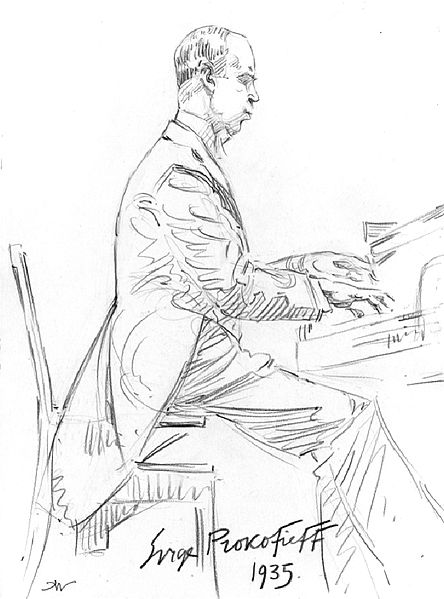 practically all musical genres. He wrote for the piano, and not just sonatas, which are among the most profound pieces in his output, but also smaller pieces, among them the Toccata, Sarcasms, and twenty Visions fugitives. He also completed five piano concertos. A superb pianist himself, he transcribed some of his own symphonic pieces to piano and played them in concerts. He wrote a lot of instrumental music: sonatas (and other pieces) for violin and for cello; he composed a wonderful flute sonata, which later, on the urging of his good friend David Oistrakh, he transcribed for the violin. His violin and cello concertos are performed regularly. He wrote symphonic music throughout his entire life, from Scythian Suite, his response to Stravinsky’s Rite of Spring, in 1915 and Symphony no. 1, Classical, in 1916, to Symphony no. 7, which he completed while ill not long before his death in 1953. And of course the ever-popular ballets; operas, some successful (like Igrok), some less so; and even very decent film scores.
practically all musical genres. He wrote for the piano, and not just sonatas, which are among the most profound pieces in his output, but also smaller pieces, among them the Toccata, Sarcasms, and twenty Visions fugitives. He also completed five piano concertos. A superb pianist himself, he transcribed some of his own symphonic pieces to piano and played them in concerts. He wrote a lot of instrumental music: sonatas (and other pieces) for violin and for cello; he composed a wonderful flute sonata, which later, on the urging of his good friend David Oistrakh, he transcribed for the violin. His violin and cello concertos are performed regularly. He wrote symphonic music throughout his entire life, from Scythian Suite, his response to Stravinsky’s Rite of Spring, in 1915 and Symphony no. 1, Classical, in 1916, to Symphony no. 7, which he completed while ill not long before his death in 1953. And of course the ever-popular ballets; operas, some successful (like Igrok), some less so; and even very decent film scores.
Prokofiev returned from France to the Soviet Union in 1936. He was promised independence and privilege, and for the rest of his life he did live a life very different from that of an average Soviet citizen. Still, he felt compelled to write “appropriate” music, for example a Cantata for the 20th Anniversary of the October Revolution, based on the writings of Marx, Lenin and Stalin, which he started almost immediately upon his arrival in Moscow. Unfortunately for Prokofiev, the music turned to be too unconventional, and wasn’t performed till much later, when both Prokofiev and Stalin were already dead. That didn’t stop Prokofiev from trying: he wrote such pieces as the cantata Zdravitsa, hailing Stalin, and music for the film Alexander Nevsky. These attempts to ingratiate himself with the Soviet leadership didn’t really help: Prokofiev, always under suspicion, completely fell from grace after the war, when the Party intensified its attacks on so-called “formalism.” In 1948 his first wife Lina was arrested on the usual trumped-up charges of espionage. Prokofiev had to work hard on creating “Soviet” music: instinctively, his music remained free of any traces of Social realism (in that he was very different from Shostakovich). The case in point is the trio of piano sonatas, sometimes called War sonatas, numbers 6, 7, 8. They were composed from 1939 through 1944. These sonatas are among the greatest in the piano repertoire of the 20th century. Number 6 was written in 1939-40, and first performed by the composer himself. Sviatoslav Richter became a great champion of this sonata. No. 7 was completed in 1942, and premiered by Richter. No. 8 was completed in 1944 and premiered by Emil Gilels. Here’s piano sonata No. 6 in A major, Op. 82, performed by Sviatoslav Richter in Locarno on September 8, 1966 (live recording). The sketch above of Sergei Prokofiev giving the premiere of his 3 Pieces Op.59 (above) was made in 1935 by Hilda Béatrice Wiener.
PermalinkApril 15, 2013. Josquin des Prez. We hope that admirers of Franz von Suppé’s operettas, Nikolai Myaskovsky’s symphonies and Giuseppe Torelli’s concerti grossi will forgive us if we skip their birthdays (all three were born this week) and instead write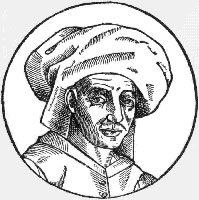 about a composer whose birthday is unknown. Josquin des Prez, one of the greatest Franco-Flemish composers, was born around 1450 (or several years later), probably in the County of Hainaut, which occupied the land on the border between modern-day Belgium and France and then part of the Duchy of Burgundy. The lands of the Duchy, geographically separated from the Burgundian proper and consisting of small counties that are now Belgium and the Netherlands, were inherited by the dukes at the end of the 14th century. The Duchy was one of the most developed European realms, both economically and artistically. Philip the Good, the duke who ruled from 1419 to 1467, was famous as a patron of painters, Jan van Eyck and Roger van der Weyden among them. Guillaume Dufay, probably the most renowned composer of the time, worked in his employ. Very little is known about Josquin’s youth. It’s assumed that around 1477 he traveled to Aix-en-Provence and was a singer in the chapel of René, Duke of Anjou. Around 1480 he worked in Milan, probably it the service of Cardinal Ascanio Sforza, well known to the fans of the TV series The Borgias. And it was probably Sforza who introduced Josquin to the Papal court in Rome. From 1489 to 1495 Josquin sang in the papal choir; a wall of the Sistine Chapel bears a graffito with his name. All the while he was also composing: we know that some of his motets are dated to those years. He probably moved to Milan around 1498 to work for the Sforzas again, and after Milan fell to the French he moved to France. In 1503 he was hired by Ercole, the Duke of Ferrara. It was here that he composed a popular Miserere, a motet for five voices in plainchant, which was probably inspired by the life and execution of Girolamo Savonarola (you can listen to it here, performed by the ensemble De Labyrintho, Walter Testolin conducting). In 1504 Josquin left Ferrara and returned to Condé-sur-l'Escaut, not far from where he was born. He lived there till his death in 1521.
about a composer whose birthday is unknown. Josquin des Prez, one of the greatest Franco-Flemish composers, was born around 1450 (or several years later), probably in the County of Hainaut, which occupied the land on the border between modern-day Belgium and France and then part of the Duchy of Burgundy. The lands of the Duchy, geographically separated from the Burgundian proper and consisting of small counties that are now Belgium and the Netherlands, were inherited by the dukes at the end of the 14th century. The Duchy was one of the most developed European realms, both economically and artistically. Philip the Good, the duke who ruled from 1419 to 1467, was famous as a patron of painters, Jan van Eyck and Roger van der Weyden among them. Guillaume Dufay, probably the most renowned composer of the time, worked in his employ. Very little is known about Josquin’s youth. It’s assumed that around 1477 he traveled to Aix-en-Provence and was a singer in the chapel of René, Duke of Anjou. Around 1480 he worked in Milan, probably it the service of Cardinal Ascanio Sforza, well known to the fans of the TV series The Borgias. And it was probably Sforza who introduced Josquin to the Papal court in Rome. From 1489 to 1495 Josquin sang in the papal choir; a wall of the Sistine Chapel bears a graffito with his name. All the while he was also composing: we know that some of his motets are dated to those years. He probably moved to Milan around 1498 to work for the Sforzas again, and after Milan fell to the French he moved to France. In 1503 he was hired by Ercole, the Duke of Ferrara. It was here that he composed a popular Miserere, a motet for five voices in plainchant, which was probably inspired by the life and execution of Girolamo Savonarola (you can listen to it here, performed by the ensemble De Labyrintho, Walter Testolin conducting). In 1504 Josquin left Ferrara and returned to Condé-sur-l'Escaut, not far from where he was born. He lived there till his death in 1521.
The attribution of Josquin’s opus is a work in progress in itself: rather than adding to it, musicologists subtract works that were traditionally credited to him. Still, even in this diminished state, the surviving corpus is large: 16 masses (though the authenticity of some of them is in doubt), and a large number of motets and chansons. His polyphonic style was highly influential, and he was the most famous composer till Palestrina more than half a century later. Here is the motet Ave Maria, performed by Tallis Scholars, and here – the first two parts from his famous Missa La sol fa re mi, Kyrie and Gloria, performed by the same ensemble. Josquin took the syllables of a phrase "Lascia fare mi" ("leave me alone" in Italian) and derived notes La (A), Sol (G), Fa (F), Re (D), and Mi (E) from it. Different figures consisting of these notes appear throughout the Mass.
PermalinkApril 8, 2013. Joshual Bell and the Academy of St. Martin in the Fields. Joshua Bell is one of the most successful American violin virtuosos, known forhis beauty of tone and exceptional technique.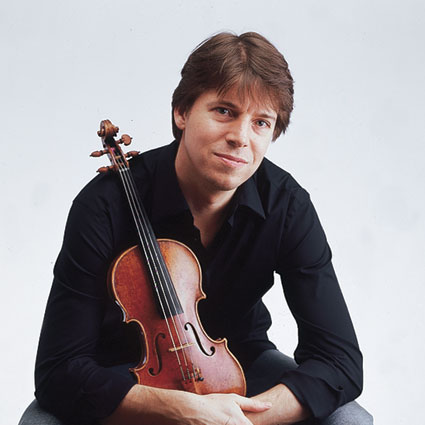 Joshua studied with Josef Gingold at the University of Indiana and later took classes with Ivan Galamian and Henryk Szeryng. When he was 14 he appeared as a soloist in a Mozart concerto with the Philadelphia Orchestra under Riccardo Muti. Three years later he played at Carnegie Hall with the St. Louis Symphony. He went on to perform at all the major concert halls, in solo recitals and with orchestras. Among his recordings are violin concertos by Beethoven, Mendelssohn, Brahms, Tchaikovsky, and Sibelius. During his career he played and recorded with Jean-Yves Thibaudet, Steven Isserlis and other musicians; he also partnered with the Saint Paul Chamber Orchestra. In 2007 in recognition of his achievements he was awarded the Avery Fisher Prize.
Joshua studied with Josef Gingold at the University of Indiana and later took classes with Ivan Galamian and Henryk Szeryng. When he was 14 he appeared as a soloist in a Mozart concerto with the Philadelphia Orchestra under Riccardo Muti. Three years later he played at Carnegie Hall with the St. Louis Symphony. He went on to perform at all the major concert halls, in solo recitals and with orchestras. Among his recordings are violin concertos by Beethoven, Mendelssohn, Brahms, Tchaikovsky, and Sibelius. During his career he played and recorded with Jean-Yves Thibaudet, Steven Isserlis and other musicians; he also partnered with the Saint Paul Chamber Orchestra. In 2007 in recognition of his achievements he was awarded the Avery Fisher Prize.
The Academy of St. Martin in the Fields is a famed chamber orchestra, which was founded by Sir Neville Marriner in 1959. Sir Neville led the orchestra till 1974, when the late Iona Brown took over (he stayed as the Chairman till 1992). Murray Perahia was the principal guest conductor for a number of years, but since Neville Marriner the orchestra didn’t have a formal music director. This changed in September 2011, when Joshua Bell was appointed music director of the Academy. A CD containing two of Beethoven’s symphonies, numbers Four and Seven, is their first collaborative recording.
Sandwiched between the two giants, Eroica, no. 3 and Symphony no. 5, a somewhat less ambitious no. 4, op. 60 was composed in 1806, the same year Beethoven completed the violin concerto and piano concerto no. 4. The symphony opens with a slow, pensive introduction, which eventually burst into a full-blooded Allegro vivace. The stately second movement, Adagio, allows the Academy strings to shine. The elegant third movement, also in the tempo of Allegro vivace, is shaped as a scherzo, and the fourth, Allegro ma non troppo, is, as the marking suggests, fast but not too much so, and is played as such. Symphony no. 7 op. 92, completed six years later, also belongs to Beethoven’s “middle period.” His hearing was deteriorating rapidly, but in 1812 he apparently still could follow a conversation and hear music. Like the Fourth, symphony no. 7 consists of four movements. The first movement, Poco sostenuto – vivace starts with a slow introduction, similar to the beginning of the Fourth, and then proceeds, rather solemnly, until it evolves into a more nimble Vivace. Some of the tonal repetitions of this movement (as well as those in other parts of the symphony) sound almost maniacal, and prompted Carl Maria von Weber to call it "fit for a madhouse." Nonetheless, it miraculously propels forward following its internal dynamics. The second movement, the somber Allegretto, remains one of Beethoven’s most popular pieces. You can listen to it here. The contrasting third movement, Presto – Assai meno presto, is full of verve, and so is the symphony’s dance-like fast-paced finale, Allegro con brio. It was not written elegantly, and the Academy interprets it that way, earthily and energetically.
For this recording, the Academy added several musicians for a total of about 40, still a relatively small ensemble compared to the modern symphony orchestra. The sound is supple and well balanced, tempos sensible, without any excesses, and the phrasing compelling. The recording sounds fresh and, we believe, portends a happy partnership between the orchestra and its new music director. We look forward to their new releases.
PermalinkApril 1, 2013. Busoni and Rachmaninov. Two composers born this week were also some of the most influential pianists of the 20th century: Ferruccio Busoni and Sergei Rachmaninov. Busoni was born on April 1, 1866 in Empoli, Tuscani. A child prodigy,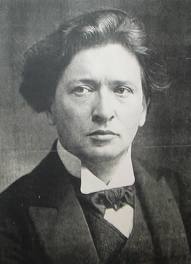 Busoni first performed publicly at the age of seven. He studied mostly in Germany, and then taught in Helsinki, Moscow, and Berlin, where he eventually settled and lived for the rest of his life (but for an interruption during the Great War). In addition to being a piano virtuoso, Busoni had many students who became famous pianists and had many students of their own. For example, Busoni’s favorite pupil, the brilliant Egon Petri, was in turn a teacher of Earl Wild, John Ogden – and Victor Borge, among many others. A very different kind of pianist, Alexander Brailowsky, who became famous for his interpretations of Chopin’s music, was also a pupil. Elena Gnessin studied with Busoni for a year while he taught at the Moscow conservatory, and then went on to establish a music school, which eventually became the Gnessin Academy. Busoni died in 1924, and most of the acoustic recordings that he made during his life are, unfortunately, of rather bad quality. There are also a number of original piano rolls, but in the opinion of his students, they do not fairly represent his pianism. Wikipedia quotes the pianist Gunnar Johansen, Egon Petri’s student, who heard Busoni play, stating that the only adequate piano roll recording is that of the Feux follets, the fifth of Liszt’s Transcendental Etudes. Here it is, courtesy of Youtube.
Busoni first performed publicly at the age of seven. He studied mostly in Germany, and then taught in Helsinki, Moscow, and Berlin, where he eventually settled and lived for the rest of his life (but for an interruption during the Great War). In addition to being a piano virtuoso, Busoni had many students who became famous pianists and had many students of their own. For example, Busoni’s favorite pupil, the brilliant Egon Petri, was in turn a teacher of Earl Wild, John Ogden – and Victor Borge, among many others. A very different kind of pianist, Alexander Brailowsky, who became famous for his interpretations of Chopin’s music, was also a pupil. Elena Gnessin studied with Busoni for a year while he taught at the Moscow conservatory, and then went on to establish a music school, which eventually became the Gnessin Academy. Busoni died in 1924, and most of the acoustic recordings that he made during his life are, unfortunately, of rather bad quality. There are also a number of original piano rolls, but in the opinion of his students, they do not fairly represent his pianism. Wikipedia quotes the pianist Gunnar Johansen, Egon Petri’s student, who heard Busoni play, stating that the only adequate piano roll recording is that of the Feux follets, the fifth of Liszt’s Transcendental Etudes. Here it is, courtesy of Youtube.
We are much luckier with Sergei Rachmaninov’s recordings. Rachmaninov, who was born on the same day in 1873, is considered one of the greatest pianists of the modern era. Just seven years older than Busoni, he lived in an era of much more advanced recording technology. He made several recordings for Edison Records, and then, in 1920, signed a contract with Victor Talking Machine Company, the predecessor of RCA Victor. While Busoni never recorded his own music, Rachmaninov played many of his own compositions for RCA: all four piano concertos, the Rhapsody on a Theme of Paganini and many piano pieces. Here is Sergei Rachmaninov playing the first movement, Moderato - Allegro of his Concerto No. 2 in C Minor. Philadelphia Orchestra, Leopold Stokowski conducting. This recording was made in April of 1929. Permalink
March 25, 2013. Bartók and Haydn. Béla Bartók was born on this day in 1881 in a small town in an Austro-Hungarian province of Banat. The town, Nagyszentmiklós, was heavily Hungarian, but the region reverted to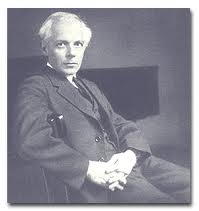 Romania after the First World War. In 1899 he moved to Budapest to study at the Royal Academy of Music. In his early years his composing style was influenced by Richard Strauss and Claude Debussy. His first significant piece was Violin concerto no. 1, composed in 1907-08 but not published till 1959, fourteen years after Bartók’s death. Three years later came his only opera, Bluebeard's Castle. Now considered a masterpiece, it was rejected at the time as not fit for the stage. During a very productive period, which lasted till the beginning of World War II, Bartók wrote two ballets, The Wooden Prince and The Miraculous Mandarin (the music to the latter, usually performed as an orchestral suite, became one of his most popular pieces), four quartets, two violin sonatas, and such masterpiece as Music for Strings, Percussion and Celesta (1936). By the end of the 1930s the conservative regime of the “regent” Miklós Horthy was siding with the Nazi Germany. Bartók, strongly anti-Nazi in his political convictions, felt increasingly uncomfortable in Hungary, and in 1940 he left for the US. He and his wife settled in New York, but the country never became their home (it’s interesting that his former pupil, Fritz Reiner by then was enjoying a flourishing career with the Pittsburgh Symphony Orchestra; Georg Solti and the pianist Lili Kraus, both his former pupils, had also left Hungary). The Bartóks were often short on money, and in 1942 Béla fell ill. Two years later Bartók was diagnosed with leukemia. His friends Joseph Szigeti, a famous violinist, and Fritz Reiner tried to help with commissions. One of such commissions, from Serge Koussevitzky's Boston Symphony, produced the famous Concerto for Orchestra. Yehudi Menuhin commissioned a Sonata for Solo Violin. Bartók died on September 26, 1945, leaving his Third Piano concerto and several other works unfinished. Here is Concerto For Orchestra, Chicago Symphony Orchestra, Georg Solti conducting (courtesy of YouTube).
Romania after the First World War. In 1899 he moved to Budapest to study at the Royal Academy of Music. In his early years his composing style was influenced by Richard Strauss and Claude Debussy. His first significant piece was Violin concerto no. 1, composed in 1907-08 but not published till 1959, fourteen years after Bartók’s death. Three years later came his only opera, Bluebeard's Castle. Now considered a masterpiece, it was rejected at the time as not fit for the stage. During a very productive period, which lasted till the beginning of World War II, Bartók wrote two ballets, The Wooden Prince and The Miraculous Mandarin (the music to the latter, usually performed as an orchestral suite, became one of his most popular pieces), four quartets, two violin sonatas, and such masterpiece as Music for Strings, Percussion and Celesta (1936). By the end of the 1930s the conservative regime of the “regent” Miklós Horthy was siding with the Nazi Germany. Bartók, strongly anti-Nazi in his political convictions, felt increasingly uncomfortable in Hungary, and in 1940 he left for the US. He and his wife settled in New York, but the country never became their home (it’s interesting that his former pupil, Fritz Reiner by then was enjoying a flourishing career with the Pittsburgh Symphony Orchestra; Georg Solti and the pianist Lili Kraus, both his former pupils, had also left Hungary). The Bartóks were often short on money, and in 1942 Béla fell ill. Two years later Bartók was diagnosed with leukemia. His friends Joseph Szigeti, a famous violinist, and Fritz Reiner tried to help with commissions. One of such commissions, from Serge Koussevitzky's Boston Symphony, produced the famous Concerto for Orchestra. Yehudi Menuhin commissioned a Sonata for Solo Violin. Bartók died on September 26, 1945, leaving his Third Piano concerto and several other works unfinished. Here is Concerto For Orchestra, Chicago Symphony Orchestra, Georg Solti conducting (courtesy of YouTube).
Franz Joseph Haydn was born on March 31, 1732 in a village of Rohrau in western Austria. In addition to string quartets and symphonies, he wrote more than 60 piano sonatas. We are fortunate to have a large collections of those: Davide Polovineo of Istituto Europeo di Musica undertook a research project into all of Haydn’s piano sonatas and uploaded many of them to Classical Connect. Here’s Sonata Hob XVI: 20 in C minor; it was composed in 1777 while Haydn was working for the Esterházys. It’s performed, superbly, by Alfred Brendel.
PermalinkMarch 18, 2013. Mostly Bach. Johann Sebastian Bach was born on March 21, 1685 in Eisenach, a town in Thuringia, Germany. His great Mass in B minor BWV 232 was one of his the last compositions to be completed in 1749 (Bach died a year later). Bach was a Lutheran, practically all of his sacred music was composed for Lutheran services, so it’s quite a mystery why Bach decided to compose a Mass, a setting for a Catholic liturgy. The Mass was probably never performed in its entirety till the revival of Bach’s music in the mid-19th century; it’s not even clear if Bach intended for it to be performed that way, as different parts are scored for different ensembles. As was so often the case in his career, Bach, who regularly had to compose a predetermined number of pieces on a tight schedule, reused much of his material written earlier. In this case, he picked Kyrie and Gloria, which he composed in 1733 as the Missa, and included them without a change as the first part of the complete Mass (he also used several sections of the same Missa to compose a cantata, Gloria in excelsis Deo, in 1745). Some music in the second part, Credo or Symbolum Nicenum, was also written earlier, but some was composed for the complete Mass. The third part, Sanctus, is a copy of a work written in 1724, and most of the music in Part IV, Osanna, Benedictus, and Agnus Dei was resued from earlier compositions. Nonetheless, by virtue of Bach’s genius, the complete Mass stands as a unified whole, and one of the greatest achievements in the history of music. Here’s Kyrie eleison, the very first section of the Mass, and here is Sanctus, Part III, which consists of only one section, and Osanna in excelsis Deo, the first section of part IV, titled Osanna, Benedictus, and Agnus Dei. They are performed by the Münchener Bach Orchester & Chor, Karl Richter conducting.
so it’s quite a mystery why Bach decided to compose a Mass, a setting for a Catholic liturgy. The Mass was probably never performed in its entirety till the revival of Bach’s music in the mid-19th century; it’s not even clear if Bach intended for it to be performed that way, as different parts are scored for different ensembles. As was so often the case in his career, Bach, who regularly had to compose a predetermined number of pieces on a tight schedule, reused much of his material written earlier. In this case, he picked Kyrie and Gloria, which he composed in 1733 as the Missa, and included them without a change as the first part of the complete Mass (he also used several sections of the same Missa to compose a cantata, Gloria in excelsis Deo, in 1745). Some music in the second part, Credo or Symbolum Nicenum, was also written earlier, but some was composed for the complete Mass. The third part, Sanctus, is a copy of a work written in 1724, and most of the music in Part IV, Osanna, Benedictus, and Agnus Dei was resued from earlier compositions. Nonetheless, by virtue of Bach’s genius, the complete Mass stands as a unified whole, and one of the greatest achievements in the history of music. Here’s Kyrie eleison, the very first section of the Mass, and here is Sanctus, Part III, which consists of only one section, and Osanna in excelsis Deo, the first section of part IV, titled Osanna, Benedictus, and Agnus Dei. They are performed by the Münchener Bach Orchester & Chor, Karl Richter conducting.
Georg Philipp Telemann, Bach’s friend and the godfather of his son Carl Philipp Emanuel, was born on March 14, 1681 in Magdeburg. One of the most prolific composers (he penned around 3000 pieces) Telemann’s legacy presents a striking example of changing fortunes. During his life he was considered a major composer, popular not just in Germany but abroad and favorably compared to J. S. Bach. Then by the 19th century his reputation sunk to such a degree that Bach’s biographers used Telemann’s name as an example of inferior composers of the time (turns out that some of the work attributed to Bach was actually written by Telemann). Of course many of the 3000 pieces Telemann wrote were mediocre, but that’s not how talents are judged. Here’s his superb cantata, Allein Gott in der Höh sei Her, which should put to rest all speculations about Telemann’s gifts. Performers are: Maurice André, trumpet, Barry McDaniel, bass, Chorale Philippe Caillard, Chamber Orchestra of Saarland Radio, Karl Ristenpart conducting.
Permalink